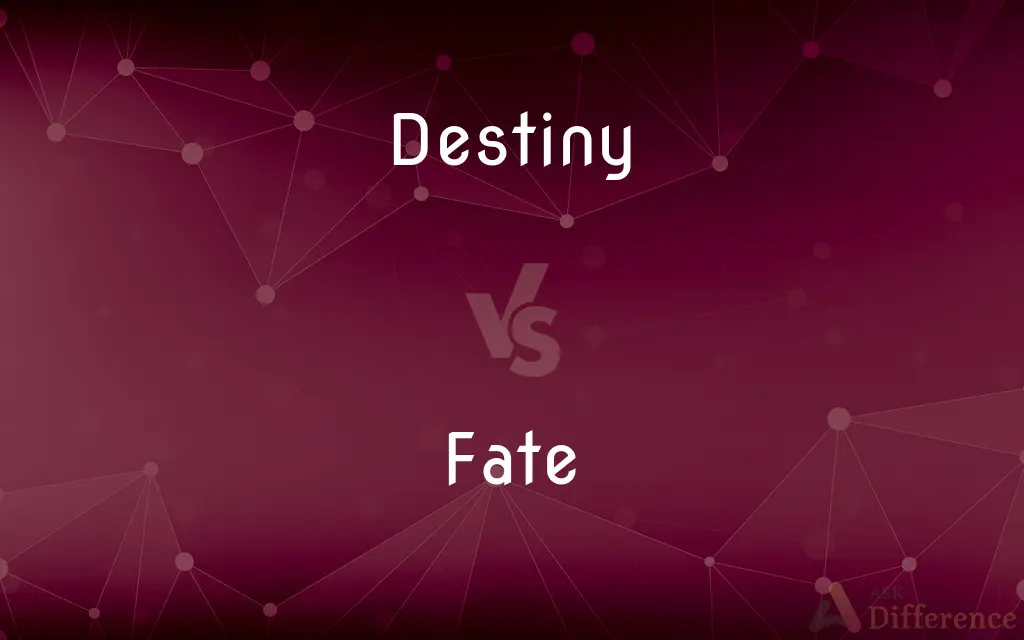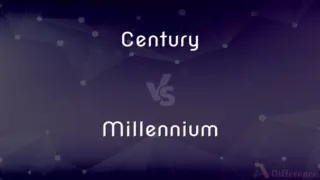Destiny vs. Fate — What's the Difference?
By Tayyaba Rehman — Updated on September 16, 2023
Destiny refers to a predetermined course of events considered as something that will inevitably happen, while Fate is the force that causes these events to occur, often seen as inevitable and unavoidable.

Difference Between Destiny and Fate
Table of Contents
ADVERTISEMENT
Key Differences
Destiny often implies a journey or path one is meant to take throughout life, aligning with purpose or potential. Fate, on the other hand, leans more towards the idea that events are preordained and will happen regardless of one's actions.
When someone refers to their Destiny, they're suggesting there's a predetermined future or end they're moving towards. In contrast, when mentioning Fate, they're typically referring to circumstances or events they believe were bound to happen, whether good or bad.
While Destiny is sometimes seen as positive and linked to one's personal aspirations or higher purpose, Fate can be neutral, encompassing both fortunate and unfortunate outcomes, and is often perceived as out of one's control.
Destiny can be thought of as a destination – the culmination of one's life's journey. Fate, conversely, might be likened to the events and conditions on the road that leads to that destination, which one encounters and cannot change.
It's worth noting that while many use Destiny and Fate interchangeably, a nuance remains: Destiny tends to empower individuals with a sense of purpose, while Fate more often emphasizes life's unpredictability and the inescapability of certain events.
ADVERTISEMENT
Comparison Chart
Nature
Journey or path in life
Preordained events
Connotation
Often positive, linked to purpose
Neutral, can be both good or bad events
Control
Suggests some level of personal agency
Typically seen as out of one's control
Connection to Individual
Linked to individual's aspirations or potential
Often perceived as external forces acting on an individual
Usage in Literature
Heroes might seek their Destiny
Heroes might try to escape their Fate
Compare with Definitions
Destiny
An eventual outcome or future that one is meant to reach.
The prophecy revealed the prince's Destiny.
Fate
The course of events determined by a higher force.
It was Fate that they met that day.
Destiny
Something that is considered bound to happen.
Their meeting felt like Destiny.
Fate
An outcome or result foreordained by destiny.
By a twist of Fate, he found the lost treasure.
Destiny
A predetermined course of events in life.
She believed it was her Destiny to become a great artist.
Fate
An inevitable outcome or circumstance.
His tragic end was sealed by Fate.
Destiny
The ultimate end or purpose in one's life.
He felt his Destiny was to lead his people to freedom.
Fate
The force or principle believed to predetermine events.
Some believe Fate cannot be changed, only embraced.
Destiny
The power determining the course of events.
Many feel that Destiny plays a hand in love.
Fate
The destined end or outcome for a person or thing.
The ship met a watery Fate.
Destiny
Destiny, sometimes referred to as fate (from Latin fatum "decree, prediction, destiny, fate"), is a predetermined course of events. It may be conceived as a predetermined future, whether in general or of an individual.
Fate
The supposed force, principle, or power that predetermines events
Fate did not favor his career.
Destiny
The events that will necessarily happen to a particular person or thing in the future
She was unable to control her own destiny
Fate
The inevitable events predestined by this force
It was her fate to marry a lout.
Destiny
The inevitable or necessary fate to which a particular person or thing is destined; one's lot.
Fate
A final result or consequence; an outcome
What was the fate of your project?.
Destiny
A predetermined course of events considered as something beyond human power or control
"Marriage and hanging go by destiny" (Robert Burton).
Fate
An unfavorable outcome in life; doom or death
Suffered a fate worse than death.
The island where the explorer met his fate.
Destiny
The power or agency thought to predetermine events
Destiny brought them together.
Fate
Fates Greek & Roman Mythology The three goddesses, Clotho, Lachesis, and Atropos, who control human destiny. Used with the.
Destiny
That to which any person or thing is destined; a predetermined state; a condition predestined by the Divine or by human will.
Death is the destiny of all mortal men.
Fate
The presumed cause, force, principle, or divine will that predetermines events.
Destiny
That which is inevitable in the fullness of time.
Fate
The effect, consequence, outcome, or inevitable events predetermined by this cause.
Destiny
One's eventual fate (not necessarily inevitable or predestined).
Fate
An event or a situation which is inevitable in the fullness of time.
Destiny
The fixed order of things; invincible necessity; an irresistible power or agency conceived of as determining the future, whether in general or of an individual.
Dara doesn't believe in using dating apps - she insists that destiny will find her other half.
Fate
Destiny; often with a connotation of death, ruin, misfortune, etc.
Accept your fate.
Destiny
That to which any person or thing is destined; predetermined state; condition foreordained by the Divine or by human will; fate; lot; doom.
Thither heWill come to know his destiny.
No man of woman born,Coward or brave, can shun his destiny.
Fate
(mythology) Fate (one of the goddesses said to control the destiny of human beings).
Destiny
The fixed order of things; invincible necessity; fate; a resistless power or agency conceived of as determining the future, whether in general or of an individual.
But who can turn the stream of destiny?
Fame comes only when deserved, and then is as inevitable as destiny, for it is destiny.
Marked by the Destinies to be avoided.
Fate
(biochemistry) The products of a chemical reaction in their final form in the biosphere.
Destiny
An event (or a course of events) that will inevitably happen in the future
Fate
(embryology) The mature endpoint of a region, group of cells or individual cell in an embryo, including all changes leading to that mature endpoint
Destiny
The ultimate agency that predetermines the course of events (often personified as a woman);
We are helpless in the face of Destiny
Fate
(transitive) To foreordain or predetermine, to make inevitable.
The oracle's prediction fated Oedipus to kill his father; not all his striving could change what would occur.
Destiny
Your overall circumstances or condition in life (including everything that happens to you);
Whatever my fortune may be
Deserved a better fate
Has a happy lot
The luck of the Irish
A victim of circumstances
Success that was her portion
Fate
A fixed decree by which the order of things is prescribed; the immutable law of the universe; inevitable necessity; the force by which all existence is determined and conditioned.
Necessity and chanceApproach not me; and what I will is fate.
Beyond and above the Olympian gods lay the silent, brooding, everlasting fate of which victim and tyrant were alike the instruments.
Fate
Appointed lot; allotted life; arranged or predetermined event; destiny; especially, the final lot; doom; ruin; death.
The great, th'important day, big with the fateOf Cato and of Rome.
Our wills and fates do so contrary runThat our devices still are overthrown.
The whizzing arrow sings,And bears thy fate, Antinous, on its wings.
Fate
The element of chance in the affairs of life; the unforeseen and unestimated conitions considered as a force shaping events; fortune; esp., opposing circumstances against which it is useless to struggle; as, fate was, or the fates were, against him.
A brave man struggling in the storms of fate.
Sometimes an hour of Fate's serenest weather strikes through our changeful sky its coming beams.
Fate
The three goddesses, Clotho, Lachesis, and Atropos, sometimes called the Destinies, or Parcæwho were supposed to determine the course of human life. They are represented, one as holding the distaff, a second as spinning, and the third as cutting off the thread.
Fate
An event (or a course of events) that will inevitably happen in the future
Fate
The ultimate agency that predetermines the course of events (often personified as a woman);
We are helpless in the face of Destiny
Fate
Your overall circumstances or condition in life (including everything that happens to you);
Whatever my fortune may be
Deserved a better fate
Has a happy lot
The luck of the Irish
A victim of circumstances
Success that was her portion
Fate
Decree or designate beforehand;
She was destined to become a great pianist
Common Curiosities
Can Destiny and Fate be used interchangeably?
They're often used interchangeably but carry nuances; Destiny leans towards purpose while Fate emphasizes inevitability.
Is Destiny always positive?
While Destiny often has a positive connotation, it simply refers to a predetermined course or outcome, which can be neutral or negative.
Does everyone have a Destiny?
This is subjective. Some believe everyone has a Destiny, while others believe life is what one makes of it, separate from Fate.
Can you fight against Fate?
Literature and folklore often depict heroes trying to change or fight against their Fate.
Is belief in Fate deterministic?
Belief in Fate often aligns with determinism, the idea that events are predetermined and inevitable.
Is Fate always out of our control?
Traditionally, Fate is seen as predetermined and out of one's control, but beliefs vary.
Can you change your Fate?
The concept of Fate suggests that events are set and unavoidable, but beliefs vary on whether Fate can be altered.
Is Destiny related to one's purpose in life?
Often, Destiny is linked to purpose or an individual's potential direction in life.
Is Destiny something you can work towards?
Some believe you can work towards or shape your Destiny, aligning with personal aspirations.
Are Destiny and Fate concepts found worldwide?
Yes, variations of Destiny and Fate concepts are found in cultures and religions globally.
Share Your Discovery

Previous Comparison
Century vs. Millennium
Next Comparison
Bingle vs. SingleAuthor Spotlight
Written by
Tayyaba RehmanTayyaba Rehman is a distinguished writer, currently serving as a primary contributor to askdifference.com. As a researcher in semantics and etymology, Tayyaba's passion for the complexity of languages and their distinctions has found a perfect home on the platform. Tayyaba delves into the intricacies of language, distinguishing between commonly confused words and phrases, thereby providing clarity for readers worldwide.















































